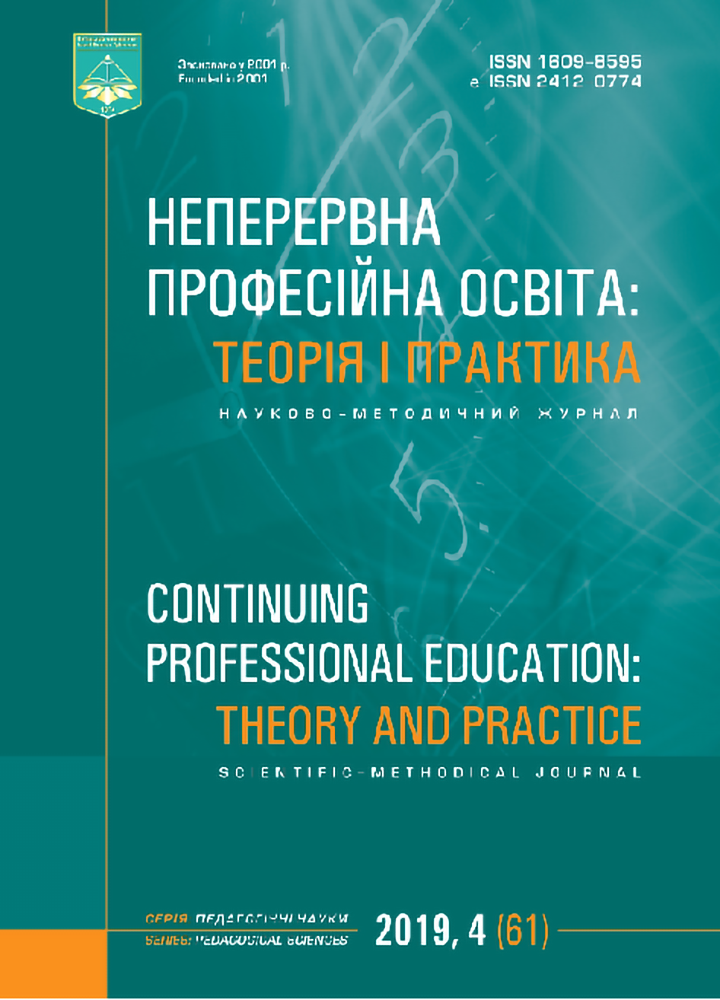CONCEPTUAL BASES OF MODELING OF UNIVERSITY INTEGRATED ENVIRONMENT: THEORETICAL ASPECT
DOI:
https://doi.org/10.28925/1609-8595.2019.4.712Keywords:
educational environment, mobile educational environment, design, modeling, conceptual fundamentals of modeling, labour market, higher education institutionsAbstract
The article deals with the conceptual fundamentals of modeling the educational environment of a higher education institution. The article examines the possibilities of designing the educational environment in universities; offers an educational environment-oriented model. The university’s educational environment is defined as a multi-faceted structure that purposefully and spontaneously influences the professional and personal development of the future specialist, ensuring his / her readiness for professional activity and / or continuation of training, successful self-realization in the process of life activity. The educational environment is a set of material factors of the educational process and interpersonal relationships that establish the subjects of education in pedagogical interaction. Points of view of Ukrainian as well as foreign researchers who have been studying the peculiarities of the educational environment in higher education are compared. The article also confirms that the problem of the deliberate break in the activity of differently orientated educational institutions can be overcome by means of educational environment modeling, which combines school, pre-university and university education with a single target setting. Importance of teachers being ready for modeling the educational environment, which results in its quality and efficiency, is also revealed in the article. Prospects for further research are to investigate the impact of the higher education institution’s educational environment on the personal and professional development of each participant in the educational process.References
Bratko, M. V. (2015). Struktura osvitnogo seredovisha vishogo navchalnogo zakladu [Structure of educational environment of higher education institution]. Naukovi zapiski Kirovogradskogo derzhavnogo pedagogichnogo universitetu imeni Volodimira Vinnichenka. Seriya: Pedagogichni nauki, 135, 67–72. Retrieved from http://nbuv.gov. ua/UJRN/Nz_p_2015_135_19 (ukr).
Kernickiy, O. (2013). Osvitnye seredovishe vishogo navchalnogo zakladu yak pedagogichnij fenomen [Educational Environment of Higher Institution as A Pedagogical Phenomenon]. Problemi inzhenerno-pedagogichnoyi osviti, 38/39, 43–50 (ukr).
Kudrya, M. M. (2012). Pedagogichni zasadi zberezhennya nacionalnoyi identichnosti vishoyi osviti Ukrayini v konteksti globalizaciyi [Pedagogical principles of preserving the national identity of higher education of Ukraine in the context of globalization]: Candidate’s thesis: 13.00.01. Kyiv, Ukraine. Retrieved from http://eprints.zu.edu.ua/8195/1/%D 0%B0%D1%80%D0%B5%D1%84_%D0%9A%D1%83%D0%B4%D1%80%D1%8F.pdf (ukr).
Martinenko, S. M. (2018). Pedagogichne modelyuvannya osvitnogo seredovisha universitetu v umovah yevrointegraciyi [Pedagogical modeling of the university’s educational environment in the context of European integration]. Osvitnij prostir Ukrayini, 14, 22–30. DOI: 10.15330/esu.14.22-30.1 (ukr).
Novikov, V. N. (2012). Obrazovatelnaya sreda vuza kak professionalno i lichnostno stimuliruyushij faktor [The educational environment of the university as a professional and personally stimulating factor]. Psihologicheskaya nauka i obrazovanie, 1. Retrieved from http://psyjournals.ru/files/50761/psyedu_ru_2012_1_Novikov_2.pdf (rus).
Pisarchuk, O. T. (2016). Pidgotovka majbutnogo vchitelya pochatkovoyi shkoli do organizaciyi osvitno-rozvivalnogo seredovisha [Preparation of the future elementary school teacher for the organization of educational and development environment]: Extended abstract of candidate’s thesis: 13.00.04. Ternopil, Ukraine (ukr).
Smilyanec, O. G. (2017). Znachennya tehnologiyi mobilnogo navchannya u stvorenni osvitnogo seredovisha vishogo navchalnogo zakladu [Importance of mobile technology education environmentcreating educational institution of higher education]. Onovlennya zmistu, form ta metodiv navchannya i vihovannya v zakladah osviti, 16, 47–50. Retrieved from http://irbis-nbuv.gov.ua/cgi-bin/opac/search.exe?I21DBN=LINK&P21DBN=UJRN&Z21I D=&S21REF=10&S21CNR=20&S21STN=1&S21FMT=ASP_meta&C21COM=S&2_S21P03=FILA=&2_ S21STR=Ozfm_2017_16_18 (ukr).
Smolyuk, A. I. (2017). Empirichne doslidzhennya roli osvitnogo seredovisha pedagogichnogo koledzhu yak chinnika profesijnogo samorozvitku majbutnih uchiteliv pochatkovoyi shkoli [An empirical study of the role of the educational environment of the pedagogical college as a factor of professional self-development of future primary school teachers]. Visnik Gluhivskogo nacionalnogo pedagogichnogo universitetu imeni Oleksandra Dovzhenka. Seriya: Pedagogichni nauki, 2, 57–64. Retrieved from http://nbuv.gov.ua/UJRN/vgnpu_2017_2_8 (ukr).
Shahbazova, M. A. (2019). Konceptualnye osnovy modelirovaniya obrazovatelnoj sredy vysshego uchebnogo zavedeniya [Conceptual bases of modeling of educational environment of higher education institution]. Mir nauki, kultury, obrazovaniya, 2, 178–180. Retrieved from https://cyberleninka.ru/article/n/kontseptualnye-osnovy-modelirovaniya-obrazovatelnoy-sredy-vysshego-uchebnogo-zavedeniya (rus).
Yasvin, V. A. (2001). Obrazovatelnaya sreda: ot modelirovaniya k proektirovaniyu [Educational environment: from modeling to design]. Moskow, Russia: Smysl (rus).
Downloads
Published
How to Cite
Issue
Section
License
Copyright (c) 2020 Lyudmila Shumigora

This work is licensed under a Creative Commons Attribution-NonCommercial 3.0 Unported License.



